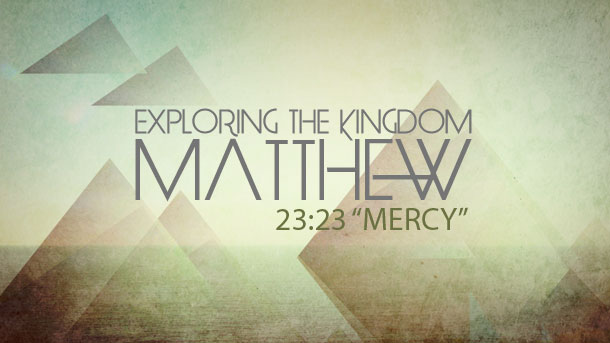I was asked to teach part of a series on the Weightier Matters of the Law, specifically, mercy.
- Three fold warning to religious leaders. How did they get to this state?
- Hosea 6. Mercy & Loving-kindness are not new concepts.
- Only those who have been transformed by the Master’s mercy can show it.
Introduction [Narrative]. We pick up our story post-death of the “greatest born among men”, John the Baptist (Matt 11:11). The Kingdom of God had entered “with violence”, or force since John (Matt 11:12). The promised Messiah had come with signs and wonders under the authority of almighty God. Blind eyes were opened, the lame walked, demons were taken under authority and cast out, cold hearts were being snatched from Satan and returned to God, the spiritually captive were liberated. It is after compassionately looking on the shepherd-less multitudes and proclaiming that the harvest is great but the laborers are few (Matt 9:36) that Jesus appoints only 12 men to go to certain cities and proclaim the gospel of the Kingdom with signs and wonders (Matt 10:1). These men would go forth as the first evangelists of this new era to proclaim the long awaited great and terrible day of the Lord, the binding up of the brokenhearted and liberty to the captives (Isa 61:1). They would go out with nothing, relying on charity for food and shelter (Matt 10:9-10). They would go up against demonic forces and religious hypocrites bent on taking the Kingdom by violence. It is shortly after returning from this first evangelistic crusade where we pick up our story.
These disciples, probably worn and weary, pluck some corn to eat while they walk. This causes an immediate accusation of lawlessness by certain religious men. These were not just ordinary men though; these were of the seed of Abraham, rigorously instructed in the teachings of Moses. These where the men who zealously kept the law in order to be holy and expedite their Messiah’s glorious coming and the restoral of God’s reign from Zion. It was these Pharisees who brought this harsh accusation against Jesus’ first disciples.
[Mat 12:1-8 KJV] [1] At that time Jesus went on the sabbath day through the corn; and his disciples were an hungred, and began to pluck the ears of corn, and to eat.
[2] But when the Pharisees saw [it], they said unto him, Behold, thy disciples do that which is not lawful to do upon the sabbath day.
Plucking grain was considered work by these Pharisees, but according to the Talmud, so was walking over 2,000 paces.[1] These Pharisees had most likely exceeded their pace limit by following Jesus around. Note that the Pharisees made the statement “Look [!]”, they did not question why. It would seem that enforcing the outward keeping of their own contextualization of tradition was more important than seeking to understand Jesus’ disciples’ motives.
[3] But he said unto them, Have ye not read what David did, when he was an hungred, and they that were with him; [4] How he entered into the house of God, and did eat the shewbread, which was not lawful for him to eat, neither for them which were with him, but only for the priests?
Jesus finds familiar and common ground with his opposition in David. Jesus did not come breaking the written Torah’s commandments or disregarding the prophets or OT wisdom. He will freely and unapologetically quote Moses, David, or any other person the Pharisees hold dear because he ministers and moves in the same principles. The Pharisees taking offense to Jesus’ ministry shows how far removed from the principles behind the law they had become.
[5] Or have ye not read in the law, how that on the sabbath days the priests in the temple profane the sabbath, and are blameless? [6] But I say unto you, That in this place is [one] greater than the temple.
“The ordinary rules for the observance of the sabbath give way before the requirements of the temple; but there are rights here before which the temple itself must give way.”[2]
Jesus is Lord of the Sabbath (vs 8), yet Jesus is defending is disciples here. If the priests could work on the Sabbath as ministers of God, Jesus, as our high priest had even more of a right to work; and not Jesus only, but all those who he has called to be citizens of his Kingdom, of his divine rule and reign which, while still to come to full fruition, began at the preaching of John.
[7] But if ye had known what [this] meaneth, I will have mercy, and not sacrifice, ye would not have condemned the guiltless. [8] For the Son of man is Lord even of the sabbath day.
This is Christ’s second warning that they should understand this phrase, the first being Matt 9:13. No other gospel includes these two phrases. Matthew’s third and final warning to practice mercy comes in chapter 23 during the 8 woes.
The law’s principles take precedence over its rituals.[3] The Sabbath was an act of mercy for both man and beast. It gave them much needed rest each week. [4] The disciples had spent much of their time extending mercy in the form of kingdom preaching. Could they not satisfy their hunger? Is the laborer not worthy of his wages (1 Tim 5:18)? “Any religious law that is contrary to mercy and the care of nature should be looked on with suspicion.”[5] When mercy is removed from the life of a Christian, vain sacrifice, penance and accusations can take its place. Moses exhorts Israel to keep the Sabbath because they were slaves in the land of Egypt (Deut 5:15). The Sabbath is truly a time for man to give mercy and receive God’s mercy. Yet these children of Abraham had used it as an occasion to accuse Jesus’ first beloved messengers, messengers of the Kingdom they themselves had been waiting for!
What happened to these men? What would cause one to be so zealous for the word of God yet be so far removed from God that he would accuse God’s own Messiah and his beloved followers? In three distinct discourses, Matthew will point out that mercy is at the core of a spiritual departure from God.
- Three fold warning to religious leaders. How did they get to this state?
[Mat 23:23 KJV] [23] Woe unto you, scribes and Pharisees, hypocrites! for ye pay tithe of mint and anise and cummin, and have omitted the weightier [matters] of the law, judgment, mercy, and faith: these ought ye to have done, and not to leave the other undone.
Matthew 23 is addressed to the crowds and disciples (23:1). The Pharisees then, while mentioned, are not necessarily the main audience of the sermon. Matthew 23 is addressed to and applicable to the ordinary disciple of Jesus, or in other words, Christians such as us.
“Pharisees were a particularly scrupulous brotherhood of teachers and laypersons committed to interpreting the law according to the traditions received from earlier Pharisees.”[6] (bold mine)
The Jewish religion influenced the Jewish society and even political structure similarly to how Christianity influences the United States in many ways. Although it is far less extreme for us in America, the Christian-based traditions of those who have gone before us—particularly in the religious community—can greatly influence how we interpret and apply scripture. Note in Matt 23:2 that Jesus didn’t seem completely opposed to ethical teaching of the Pharisees, but was displeased that they did not apply it to their own lives.
Today, one can put too much “weight” on isolated passages and use them to damage other Christians and/or potentially ignore key foundational principles of the gospel.
Matthew is the only writer who specifies three instances of Jesus exhorting the Pharisees to learn and practice mercy. And what disciple needed mercy more. Matthew, who was already despised by many of the Jews and viewed as unfit for the Kingdom of God by many of the Pharisees, left is lucrative job to follow Jesus. Unlike Peter and John, Matthew would most likely not have been able to return to his position. Matthew would have remained an outcast from Jewish society. The final plea Matthew records comes in the form of a woe.
[Mat 9:13 KJV] [13] But go ye and learn what [that] meaneth, I will have mercy, and not sacrifice: for I am not come to call the righteous, but sinners to repentance.
[Mat 12:7 KJV] [7] But if ye had known what [this] meaneth, I will have mercy, and not sacrifice, ye would not have condemned the guiltless.
[Mat 23:23 KJV] [23] Woe unto you, scribes and Pharisees, hypocrites! for ye pay tithe of mint and anise and cummin, and have omitted the weightier [matters] of the law, judgment, mercy, and faith: these ought ye to have done, and not to leave the other undone.
Jesus ends his final public dissertation with a heartfelt plea, “Oh Jerusalem, Jerusalem!” In spite of their past failures and their killings of the messengers and prophets, how Jesus still longs for them to be gathered to God as a mother hen would gather her children under her protective wing. As we compare this loving rebuke with a similar plea in Hosea 6:6, we will find once again that while God’s words are harsh on the surface, it is mercy and compassion that compels the chastisement.
(Cain = first murder (Gen 4:8), Zechariah = last martyr recorded in history books of O.T. (2 Chron 24:22)
- Hosea 6. Mercy & Loving-kindness are not new concepts.
[Hos 6:1-6 KJV] [1] Come, and let us return unto the LORD: for he hath torn, and he will heal us; he hath smitten, and he will bind us up.
The writer shows his understanding that it is God who has torn and smitten, yet he also understands his mercy. Knowing the mercy of God can be the difference between running to God (repenting) and fleeing from him. God has smitten, but never beyond the point of being able to bind up. Hosea’s attitude towards God is correct, and as such he should preach this word to the people.
[2] After two days will he revive us: in the third day he will raise us up, and we shall live in his sight.
“Two” is often used for “a few”, 1 Kings 17:12, Isaiah 7:21. Here signifies a short time.
[3] Then shall we know, [if] we follow on to know the LORD: his going forth is prepared as the morning; and he shall come unto us as the rain, as the latter [and] former rain unto the earth.
Conditional, “if” we follow, they shall see that God is not far from them, regardless of how the situation may appear.
if we follow on to know the LORD, or “pursue knowledge of the LORD”. This is almost surely tying back to Hosea’s prior statement “my people are destroyed for lack of knowledge”. Israel is encouraged to pursue the knowledge of the LORD, to follow on to KNOW the LORD.
[4] O Ephraim, what shall I do unto thee? O Judah, what shall I do unto thee? for your goodness [is] as a morning cloud, and as the early dew it goeth away.
“goodness”, this same word is translated “mercy” the majority of the time in the KJV (149x mercy vs 12x for goodness). Can also be translated “loving-kindness”. Their mercy & loving-kindness was fleeting, present for a moment, then gone.
[5] Therefore have I hewed [them] by the prophets; I have slain them by the words of my mouth: and thy judgments [are as] the light [that] goeth forth.
“I sent my prophets to cut you to pieces–to slaughter you with my words, with judgments as inescapable as light.”[7]
This merciful God desires his people to be merciful, good and kind. He will do this by loving chastisement. The further removed Israel became, the harsher the discipline would be
[6] For I desired mercy, and not sacrifice; and the knowledge of God more than burnt offerings.
Israel was given sacrificial ordinances in Leviticus. Sacrifice is not the primary element that goes into forgiveness of sins, it is confession and encounter with God. Sacrifice is a mechanism that helps foster this interaction with God and mankind.
Sacrifices such as tithing of mint and cumin are not a substitute for the knowledge of God. Hosea again resorts back to his earlier rebuke:
[Hos 4:6 KJV] [6] My people are destroyed for lack of knowledge: because thou hast rejected knowledge, I will also reject thee, that thou shalt be no priest to me: seeing thou hast forgotten the law of thy God, I will also forget thy children.
Why would Jesus resort to this scripture hundreds of years later to rebuke the Pharisees who knew the law like the back of their hands, being baptized into the Torah and oral law from birth? Because they had not practiced the qualities of God, they had not practiced the attributes of God’s priests… justice, mercy, walking humbly with God. It is by practicing these traits that we become closer to God. Without these traits, can one truly say they know God? Sacrifices assisted in their interaction with God, but the sacrifice itself cannot be the main thing. It is so with our service to God today (though I give my body to be burned and have not love… 1 Cor 13).
- Only those who have been transformed by the Master’s mercy can truly exhibit it.
Merciful (Adjective, and Verb, to Be), Mercy (Noun, and Verb, to Have, Etc.): “is the outward manifestation of pity; it assumes need on the part of him who receives it, and resources adequate to meet the need on the part of him who shows it.”[8]
“Outward manifestation” is key. The external acts of true mercy come as a result of an inward change. This will be discussed more when we look at the beatitudes.
God is shown to be merciful.
[Mat 18:21-35 KJV] [21] Then came Peter to him, and said, Lord, how oft shall my brother sin against me, and I forgive him? till seven times? [22] Jesus saith unto him, I say not unto thee, Until seven times: but, Until seventy times seven. [23] Therefore is the kingdom of heaven likened unto a certain king, which would take account of his servants. [24] And when he had begun to reckon, one was brought unto him, which owed him ten thousand talents. [25] But forasmuch as he had not to pay, his lord commanded him to be sold, and his wife, and children, and all that he had, and payment to be made. [26] The servant therefore fell down, and worshipped him, saying, Lord, have patience with me, and I will pay thee all. [27] Then the lord of that servant was moved with compassion, and loosed him, and forgave him the debt. [28] But the same servant went out, and found one of his fellowservants, which owed him an hundred pence: and he laid hands on him, and took [him] by the throat, saying, Pay me that thou owest. [29] And his fellowservant fell down at his feet, and besought him, saying, Have patience with me, and I will pay thee all. [30] And he would not: but went and cast him into prison, till he should pay the debt. [31] So when his fellowservants saw what was done, they were very sorry, and came and told unto their lord all that was done. [32] Then his lord, after that he had called him, said unto him, O thou wicked servant, I forgave thee all that debt, because thou desiredst me: [33] Shouldest not thou also have had compassion (Greek = mercy) on thy fellowservant, even as I had pity (Greek = mercy) on thee? [34] And his lord was wroth, and delivered him to the tormentors, till he should pay all that was due unto him. [35] So likewise shall my heavenly Father do also unto you, if ye from your hearts forgive not every one his brother their trespasses.
Compassion and Pity (vs 33) is the same Greek word translated mercy in most instances, particular Matthew 5:7. Mercy should not be separated from a genuine compassion and empathy towards the recipient’s state.
It’s important to note that the servant of the wicked servant was in his debt. Those we are called to show mercy to will often be in our debt in terms of a wrongdoing they have done, often against us. Those who need mercy are typically guilty of some debt or trespass. If a woman is on trial in court and found guilty by indisputable evidence, that woman is in need of mercy. If the judge decides to dismiss the verdict of guilty and dismiss the penalty, he has had mercy on that woman. Now, if that woman was found not guilty by indisputable evidence, that judge has no way to show her mercy because she is in need of none. It is not the innocent or righteous who needs mercy, but the guilty.
[Mat 5:7 KJV] [7] Blessed [are] the merciful: for they shall obtain mercy.
Blessed (happy) are those who show mercy. I believe the “blessed” part is a promise for the future and for now. To truly show mercy we will probably be wronged at some point or have someone indebted to us. Yes mercy is being compassionate, but it extends beyond that specifically to a dismissal of owed debt.
We can connect the beatitudes to the story we just read of the unjust servant. Who wants mercy? Everyone. Who wants to go to heaven? Everyone. The difference between a citizen of the Kingdom of Heaven and goats are that Kingdom citizens recognize their spiritual poverty (Matt 5:3), they mourn over the realization of their sin (Matt 5:4), they are meek, realizing their own low estate (Matt 5:5), and they hunger and thirst to be in right standing with God, to see justice done (Matt 5:6). It is these qualities that compel one to show mercy (Matt 5:7).
We see it over and over it Matthew. Jesus came to call the sinners to repentance (Matt 9:13). Those who are well do not need a physician (or, those who do not acknowledge their sickness will reject the physician). Anyone will reach out their hand to receive mercy, any one will stand at the alter if you tell them they can get to heaven that way, most people will get dunked in water if they think it will get them to heaven. Yet one of the true signs of a born-again follower of God, a sheep, the wheat among the tares, is that they cannot help but reflect the mercy that Christ has shown them.
Those who show mercy are the one who will obtain it in the final judgment. But this statement must be understood correctly. We don’t show mercy to tally up points to obtain it on judgment day. Rather, showing mercy is a sign that one has passed from death to life, and will not be judged. It is those who have greedily accepted a promise of eternal life but never realized their sinful state enough to truly repent and show mercy that will be judged. Jesus has two types of servants, righteous and wicked. They may occasionally look the same, but the ability to show genuine mercy, compassion and forgiveness is a sign of a true servant. How can one who’s realized they he or she is “by nature a child of wrath”, have anything but a gracious gratitude for salvation that reflects the Master’s mercy?
End—
Next Week:
As priests of God we have been called to exercise both mercy and judgment (justice). Indeed, these two must go hand in hand. In Jesus’ teachings in Matthew we see a beautiful combination of both. The final cry is a woe to turn from deadly sin; while seemingly harsh, this is a last ditch, merciful effort.
Christianity is not just handouts, but a hand reaching out to lift up, strengthen and build up to perfection. The prostitute needs a safe home off of the streets to stay the night in, but also instruction in getting out of that lifestyle. The addict needs not only understanding but also a system of accountability leading to rehabilitation. While Christians are justified, there is still justice that must go forth in the body of Christ.
End—
Bonus Material
Summary of the signs of the religious hypocrite:
- “They shut people out of the kingdom of God by their own example and teaching (v. 13).
- They travel the world to get a convert and then make him a child of hell (v. 15).
- They change their rules to suit themselves, qualifying the requirements of God’s law to allow latitude in some areas but not in others (vv. 16–21).
- They make minor things important while leaving major things undone (vv. 23–24).
- They are concerned with external purity while inside they are unclean (vv. 25–26).
- They appear to be morally upright before men, even though they are full of lawlessness (vv. 27–28).
- They boast in the past while failing to live according to the example of faith from the past (vv. 29–32).”[9]
Misc Notes:
“23:23 “you tithe mint and dill and cummin” In their legalism, they counted even the smallest spices so as to give precisely ten percent to God, but they neglected justice, love, and fidelity. The New Testament does not speak of tithing except here. The heart of New Testament giving is not found in a percentage (cf. 2 Cor. 8–9)!
NT believers must be careful of turning Christianity into a new legal performance oriented code (Christian Talmud). Their desire to be pleasing to God causes them to try to find guidelines for every area of life. However, theologically it is dangerous to pull old covenant rules which are not reaffirmed in the NT and make them dogmatic criteria especially when they are claimed to be causes or promises of prosperity!”[10]
[1]. Robert James Utley, The First Christian Primer: Matthew, vol. Volume 9, Study Guide Commentary Series (Marshall, TX: Bible Lessons International, 2000), 106.
[2]. Robert Jamieson, A. R. Fausset, and David Brown, Commentary Critical and Explanatory on the Whole Bible, vol. 2 (Oak Harbor, WA: Logos Research Systems, Inc., 1997), 39–40.
[3]. Craig S. Keener, Matthew, vol. 1, The IVP New Testament Commentary Series (Downers Grove, IL: InterVarsity Press, 1997), Mt 12:3.
[4]. Warren W. Wiersbe, The Bible Exposition Commentary, vol. 1 (Wheaton, IL: Victor Books, 1996), 42.
[5]. Wiersbe, 42.
[6]. Craig S. Keener, Matthew, vol. 1, The IVP New Testament Commentary Series (Downers Grove, IL: InterVarsity Press, 1997), Mt 23:1.
[7]. Hos 6:5 (New Living Translation).
[8]. Vine’s Expository Dictionary of New Testament Words.
[9]. Iain D. Campbell, Opening up Matthew, Opening Up Commentary (Leominster: Day One Publications, 2008), 140.
[10]. Robert James Utley, The First Christian Primer: Matthew, vol. Volume 9, Study Guide Commentary Series (Marshall, TX: Bible Lessons International, 2000), 190.



